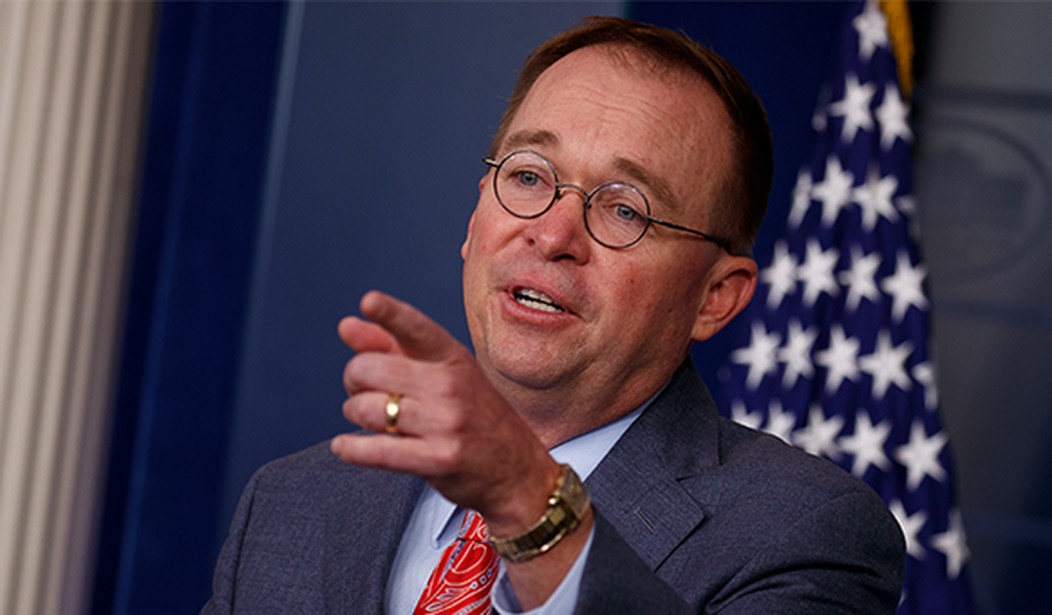Sometimes political figures say something they shouldn't have, and they're forced to walk it back. One option under such circumstances is to own the mistake and correct the record. Another potential solution is to go the 'misspoke' route, which may or may not hold water, depending on the circumstances. A third path is to defiantly deny that the problem or mistake ever happened in the first place -- which is a much heavier lift when there is video evidence of the quote in question. Acting White House Chief of Staff Mick Mulvaney evidently decided to open door number three after appearing to admit on Thursday that there was a quid pro quo between the Trump administration and the Ukrainian government after all. Here is what Mulvaney said in an exchange with ABC News correspondent Jonathan Karl:
Karl: So the demand for an investigation into the Democrats was part of the reason that it was ordered to withhold funding to Ukraine?
Mulvaney: The look-back to what happened in 2016 certainly was part of the thing that he was worried about in corruption with that nation. And that is absolutely appropriate.
Karl: For withholding the funding?
Mulvaney: Which ultimately then, flowed. We were worried if we didn't pay out the money it would be illegal, it would be unlawful...
Karl: But to be clear, what you just described is a quid-pro-quo: The funding will not flow unless you're getting an investigation into the Democratic server, happened as well.
Mulvaney: We do that all the time with foreign policy. We were holding up money at the same time to the Northern Triangle countries so they would change their policies on immigration. This speaks to an important point because I heard this yesterday and I can never remember the gentleman who testified. Was it Mckinney? I don't remember, he testified yesterday...he said yesterday that he was really upset with the political influence in foreign policy. I have news for everybody: get over it. There's going to be political influence in foreign policy. That is going to happen. Elections have consequences, and the foreign policy is going to change from the Obama administration to the Trump administration.
In that last follow-up, Karl asked a specific question. He inquired as to whether the temporary withholding of military aid funds was linked to a desired investigation by the Ukrainians, as requested by the Trump administration. Karl literally referred to that arrangement as a quid pro quo. Mulvaney replied by saying that such things happen "all the time" in foreign policy, later adding that critics should "get over it." Shortly thereafter, Mulvaney put out a statement accusing the media of 'misconstruing' what he said:
Recommended
Read Mick Mulvaney’s statement, walking back today’s comments here: pic.twitter.com/cnhbLW0DB0
— Peter Alexander (@PeterAlexander) October 17, 2019
He was pressed on this point by Fox News Sunday anchor Chris Wallace, who played Mulvaney's tape back to him as a rebuttal to his new explanation:
EXCLUSIVE Interview: Acting White House Chief of Staff Mick Mulvaney joined us live to respond to his remarks on U.S. aid to Ukraine. #FNS #FoxNews pic.twitter.com/MeGhGXeCqK
— FoxNewsSunday (@FoxNewsSunday) October 20, 2019
Wallace has Mulvaney dead to rights here. Karl's question was explicit, and the White House Chief of Staff responded the way he did. That's simply the reality of what happened. There was no "misconstruing." Perhaps Mulvaney could have plausibly said that he's misheard or misunderstood Karl's question. Perhaps he could have stuck with the line that a quid pro quo involving a probe into Ukraine's 2016 meddling -- which is a real story and a legitimate cause for concern -- was actually fully appropriate. That would have been controversial and debatable, but not entirely crazy. A foreign government interfering in an American election with the express goal of helping defeat one of the candidates is a serious matter and deserves significant scrutiny; whether Ukraine's 2016 actions would merit holding up Congressionally-appropriated military assistance is another question, of course, but the point stands. Relatedly, I should also note that the 'Crowdstrike'/server issue regarding Ukraine, unlike the broader meddling question, appears to be a baseless conspiracy that does not remotely represent a legitimate issue in this context.
But Mulvaney went another direction with his damage control strategy. He didn't claim that he misunderstood the question. He did seem to argue that the quid pro quo was justified and somewhat routine (it should be noted that the US attaches strings to foreign money all the time; indeed, the whole argument that Joe Biden wasn't engaged in corruption when he threatened to withhold money from Ukraine was that he was appropriately doing so in pursuit of American interests and anti-corruption good governance). But after admitting to a quid pro quo involving the military aid, Mulvaney is now trying to argue that he never said what he clearly said, on camera. If he meant something else, that's on him. In this case it's not evidence of 'bias' that the press reported what he literally said, the plain-english meaning of which did not seem ambiguous. Meanwhile, here's Mulvaney explaining why the president didn't anticipate the firestorm over his since-reversed decision to host next year's G7 conference at a Trump property:
“He was honestly surprised at the level of pushback,” Mulvaney says of Trump selecting his Doral resort to host G-7. “At the end of the day, he still considers himself to be in the hospitality business,” Mulvaney says of the president of the United States
— Manu Raju (@mkraju) October 20, 2019
But he's not in the hospitality business so long as he's President of the United States, and his business interests and concerns must, ethically, take a back seat to the job of governing the country -- which is what Trump pledged, and which also entails the avoidance of conflicts of interest or self-dealing, real or perceived. This New York Post editorial made the salient point:
Trump is rightly proud of what he built in his earlier career. But he has a new job now — and a public trust. When you become leader of the Free World, there are some things you have to give up, including any hint of promoting your own properties. It’s not the obscure issue of “emoluments,” nor the folks who (as Mulvaney put it) “will never get over the fact that it’s a Trump property” that you have to think about, sir. It’s that voters expect and deserve clear signs that their president is working for them — not promoting himself.
I'm glad the president has abandoned this plan, which should not have been defended by anyone, though some Republicans reflexively did just that:
Sen. [Kevin] Cramer (R-ND) on Trump’s decision to award G7 summit to his own Miami property: “It may seem careless politically, but on the other hand there's tremendous integrity in his boldness and his transparency”https://t.co/50KObtK7q9
— Catherine Rampell (@crampell) October 18, 2019
Not everything can, or should, be defended. Just because the media is profoundly biased, and far too often outright hysterical, about this president doesn't mean that bad, unwise, or unethical presidential decisions must be praised as evidence of "tremendous integrity" and "boldness," or whatever.























Join the conversation as a VIP Member